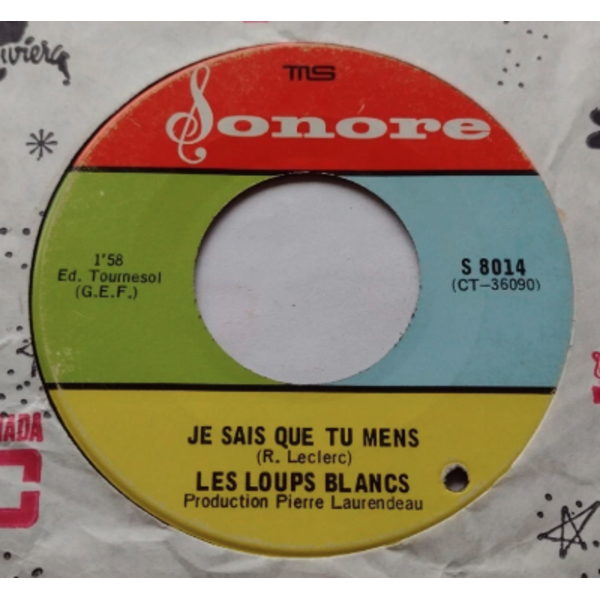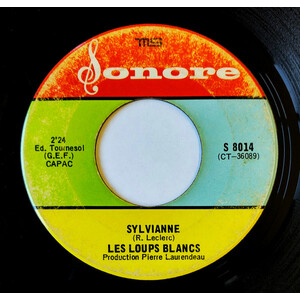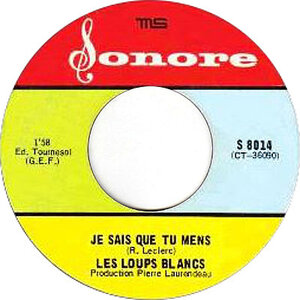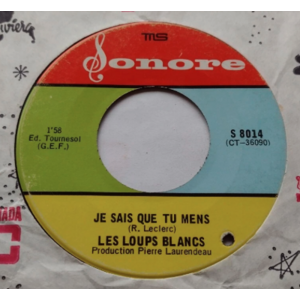Information/Write-up
Formed in Montreal in 1965, Les Loups Blancs were a sharp-dressed, beat-influenced quartet known for their slick blonde haircuts and British Invasion aesthetic. Early on, they gained local fame performing at youth festivals, dance halls, and on television programs such as Jeunesse d’aujourd’hui, bringing an energetic, francophone twist to the Merseybeat sound.
The original lineup included Daniel Ledoux, Maurice Bastien, Yvon Gauthier, and Bernard Saint-Onge—teenagers with a flair for showmanship and matching suits. In 1967, Paul Daraîche replaced Ledoux on vocals and guitar, co-writing their first single “Ce rire dans tes yeux” b/w “Si tu veux rester mon ami” (Sonore, 1967), which showcased their early Beatlesque harmonies.
Their second and final release, “Je sais que tu mens” b/w “Sylvianne” (Sonore, 1968), was a leaner, sharper outing. Featuring new members Jacques Tremblay on bass and Mario Chevrette on piano, the single is now considered a cult favorite of Quebec’s late-60s garage scene. While critics at the time dismissed it as “confused” and “average,” later reissues and compilations revealed a raw charm and melodic confidence that aged better than many of their contemporaries.
The group briefly made national headlines in 1968 when bassist Yvon Gauthier’s televised wedding was derailed mid-ceremony by a furious priest who refused to give the blessing, citing the cameras and “theatrical” nature of the event. The bizarre scandal made the band infamous in tabloids and helped cement their image as rebellious teen idols.
By 1971, the band had rebranded as Soleil, shifting toward a more adult pop-rock sound before disbanding in 1973.
Single review:
The second and final single from Montreal’s Les Loups Blancs is a gem of Quebec’s late-60s beat scene—melodic, dramatic, and brimming with youthful swagger. Released in 1968 on the respected Sonore label, “Je sais que tu mens” hits with clipped harmonies, sharp guitar hooks, and a confessional vocal line that teeters between accusation and heartbreak. Clocking in under two minutes, it’s a perfect slice of mod-franco-pop with echoes of The Hollies or early Jacques Dutronc, refined just enough to stand out from the more disposable yé-yé of the time.
The flip, “Sylvianne”, is more subdued—a melancholy ballad steeped in longing, with a wistful melody and softer delivery. Both tracks were penned by R. Leclerc and produced by Pierre Laurendeau, who captures the band’s live-wire energy and vulnerability in equal measure.
While contemporary critics were lukewarm—calling the production “confused” and the performance “average”—the record has aged remarkably well, especially as Quebec 45s from this era become increasingly rare. The raw sincerity that once made it seem unpolished now gives it charm and edge.
Outside the grooves, the group made headlines in 1968 for a bizarre wedding scandal when bassist Yvon Gauthier was refused a marriage blessing by a priest mid-ceremony—after a film crew showed up to televise the event. The priest reportedly stormed out, denouncing the scene as theatrical. The incident, widely reported in the press, immortalized Les Loups Blancs in Quebec pop culture lore as much for drama off-stage as on.
Ultimately, “Je sais que tu mens” endures—not as a chart hit, but as a snapshot of a young Montreal band with heart, harmony, and a flair for the unpredictable.
-Robert Williston
Paul Daraîche: vocals, guitar
Jacques Tremblay: bass
Mario Chevrette: piano
Bernard Saint-Onge: drums




No Comments